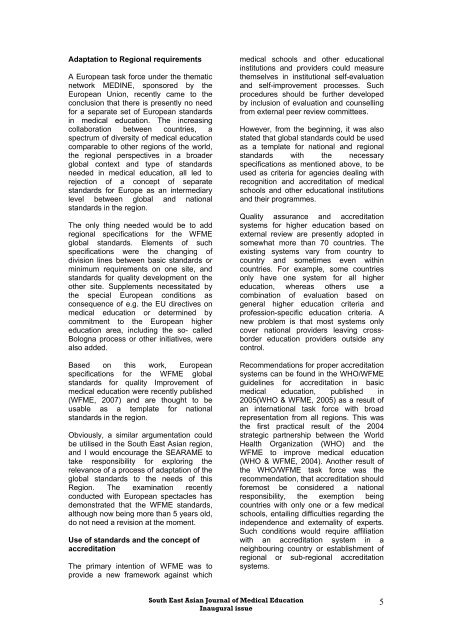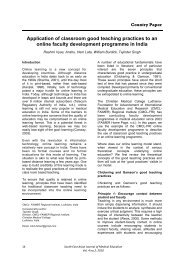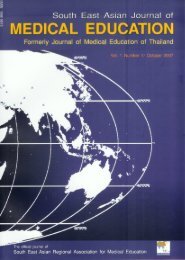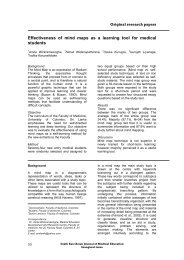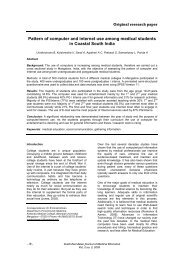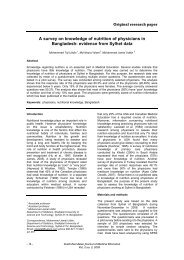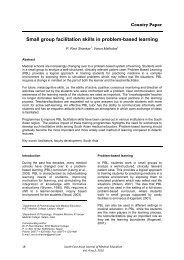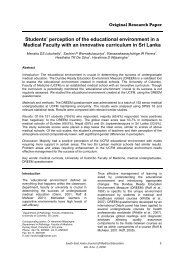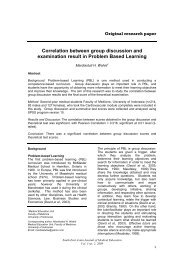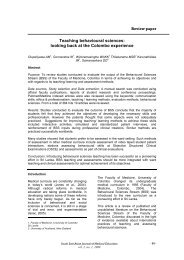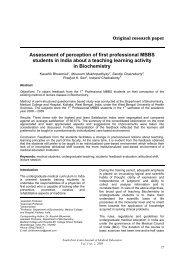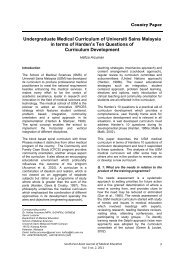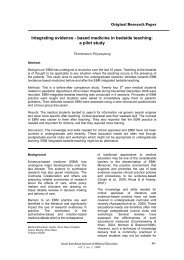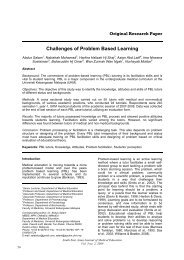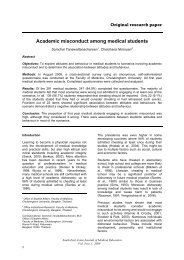Relevance of the WFME global standards in medical education to ...
Relevance of the WFME global standards in medical education to ...
Relevance of the WFME global standards in medical education to ...
Create successful ePaper yourself
Turn your PDF publications into a flip-book with our unique Google optimized e-Paper software.
Adaptation <strong>to</strong> Regional requirements<br />
A European task force under <strong>the</strong> <strong>the</strong>matic<br />
network MEDINE, sponsored by <strong>the</strong><br />
European Union, recently came <strong>to</strong> <strong>the</strong><br />
conclusion that <strong>the</strong>re is presently no need<br />
for a separate set <strong>of</strong> European <strong>standards</strong><br />
<strong>in</strong> <strong>medical</strong> <strong>education</strong>. The <strong>in</strong>creas<strong>in</strong>g<br />
collaboration between countries, a<br />
spectrum <strong>of</strong> diversity <strong>of</strong> <strong>medical</strong> <strong>education</strong><br />
comparable <strong>to</strong> o<strong>the</strong>r regions <strong>of</strong> <strong>the</strong> world,<br />
<strong>the</strong> regional perspectives <strong>in</strong> a broader<br />
<strong>global</strong> context and type <strong>of</strong> <strong>standards</strong><br />
needed <strong>in</strong> <strong>medical</strong> <strong>education</strong>, all led <strong>to</strong><br />
rejection <strong>of</strong> a concept <strong>of</strong> separate<br />
<strong>standards</strong> for Europe as an <strong>in</strong>termediary<br />
level between <strong>global</strong> and national<br />
<strong>standards</strong> <strong>in</strong> <strong>the</strong> region.<br />
The only th<strong>in</strong>g needed would be <strong>to</strong> add<br />
regional specifications for <strong>the</strong> <strong>WFME</strong><br />
<strong>global</strong> <strong>standards</strong>. Elements <strong>of</strong> such<br />
specifications were <strong>the</strong> chang<strong>in</strong>g <strong>of</strong><br />
division l<strong>in</strong>es between basic <strong>standards</strong> or<br />
m<strong>in</strong>imum requirements on one site, and<br />
<strong>standards</strong> for quality development on <strong>the</strong><br />
o<strong>the</strong>r site. Supplements necessitated by<br />
<strong>the</strong> special European conditions as<br />
consequence <strong>of</strong> e.g. <strong>the</strong> EU directives on<br />
<strong>medical</strong> <strong>education</strong> or determ<strong>in</strong>ed by<br />
commitment <strong>to</strong> <strong>the</strong> European higher<br />
<strong>education</strong> area, <strong>in</strong>clud<strong>in</strong>g <strong>the</strong> so- called<br />
Bologna process or o<strong>the</strong>r <strong>in</strong>itiatives, were<br />
also added.<br />
Based on this work, European<br />
specifications for <strong>the</strong> <strong>WFME</strong> <strong>global</strong><br />
<strong>standards</strong> for quality Improvement <strong>of</strong><br />
<strong>medical</strong> <strong>education</strong> were recently published<br />
(<strong>WFME</strong>, 2007) and are thought <strong>to</strong> be<br />
usable as a template for national<br />
<strong>standards</strong> <strong>in</strong> <strong>the</strong> region.<br />
Obviously, a similar argumentation could<br />
be utilised <strong>in</strong> <strong>the</strong> South East Asian region,<br />
and I would encourage <strong>the</strong> SEARAME <strong>to</strong><br />
take responsibility for explor<strong>in</strong>g <strong>the</strong><br />
relevance <strong>of</strong> a process <strong>of</strong> adaptation <strong>of</strong> <strong>the</strong><br />
<strong>global</strong> <strong>standards</strong> <strong>to</strong> <strong>the</strong> needs <strong>of</strong> this<br />
Region. The exam<strong>in</strong>ation recently<br />
conducted with European spectacles has<br />
demonstrated that <strong>the</strong> <strong>WFME</strong> <strong>standards</strong>,<br />
although now be<strong>in</strong>g more than 5 years old,<br />
do not need a revision at <strong>the</strong> moment.<br />
Use <strong>of</strong> <strong>standards</strong> and <strong>the</strong> concept <strong>of</strong><br />
accreditation<br />
The primary <strong>in</strong>tention <strong>of</strong> <strong>WFME</strong> was <strong>to</strong><br />
provide a new framework aga<strong>in</strong>st which<br />
<strong>medical</strong> schools and o<strong>the</strong>r <strong>education</strong>al<br />
<strong>in</strong>stitutions and providers could measure<br />
<strong>the</strong>mselves <strong>in</strong> <strong>in</strong>stitutional self-evaluation<br />
and self-improvement processes. Such<br />
procedures should be fur<strong>the</strong>r developed<br />
by <strong>in</strong>clusion <strong>of</strong> evaluation and counsell<strong>in</strong>g<br />
from external peer review committees.<br />
However, from <strong>the</strong> beg<strong>in</strong>n<strong>in</strong>g, it was also<br />
stated that <strong>global</strong> <strong>standards</strong> could be used<br />
as a template for national and regional<br />
<strong>standards</strong> with <strong>the</strong> necessary<br />
specifications as mentioned above, <strong>to</strong> be<br />
used as criteria for agencies deal<strong>in</strong>g with<br />
recognition and accreditation <strong>of</strong> <strong>medical</strong><br />
schools and o<strong>the</strong>r <strong>education</strong>al <strong>in</strong>stitutions<br />
and <strong>the</strong>ir programmes.<br />
Quality assurance and accreditation<br />
systems for higher <strong>education</strong> based on<br />
external review are presently adopted <strong>in</strong><br />
somewhat more than 70 countries. The<br />
exist<strong>in</strong>g systems vary from country <strong>to</strong><br />
country and sometimes even with<strong>in</strong><br />
countries. For example, some countries<br />
only have one system for all higher<br />
<strong>education</strong>, whereas o<strong>the</strong>rs use a<br />
comb<strong>in</strong>ation <strong>of</strong> evaluation based on<br />
general higher <strong>education</strong> criteria and<br />
pr<strong>of</strong>ession-specific <strong>education</strong> criteria. A<br />
new problem is that most systems only<br />
cover national providers leav<strong>in</strong>g crossborder<br />
<strong>education</strong> providers outside any<br />
control.<br />
Recommendations for proper accreditation<br />
systems can be found <strong>in</strong> <strong>the</strong> WHO/<strong>WFME</strong><br />
guidel<strong>in</strong>es for accreditation <strong>in</strong> basic<br />
<strong>medical</strong> <strong>education</strong>, published <strong>in</strong><br />
2005(WHO & <strong>WFME</strong>, 2005) as a result <strong>of</strong><br />
an <strong>in</strong>ternational task force with broad<br />
representation from all regions. This was<br />
<strong>the</strong> first practical result <strong>of</strong> <strong>the</strong> 2004<br />
strategic partnership between <strong>the</strong> World<br />
Health Organization (WHO) and <strong>the</strong><br />
<strong>WFME</strong> <strong>to</strong> improve <strong>medical</strong> <strong>education</strong><br />
(WHO & <strong>WFME</strong>, 2004). Ano<strong>the</strong>r result <strong>of</strong><br />
<strong>the</strong> WHO/<strong>WFME</strong> task force was <strong>the</strong><br />
recommendation, that accreditation should<br />
foremost be considered a national<br />
responsibility, <strong>the</strong> exemption be<strong>in</strong>g<br />
countries with only one or a few <strong>medical</strong><br />
schools, entail<strong>in</strong>g difficulties regard<strong>in</strong>g <strong>the</strong><br />
<strong>in</strong>dependence and externality <strong>of</strong> experts.<br />
Such conditions would require affiliation<br />
with an accreditation system <strong>in</strong> a<br />
neighbour<strong>in</strong>g country or establishment <strong>of</strong><br />
regional or sub-regional accreditation<br />
systems.<br />
South East Asian Journal <strong>of</strong> Medical Education<br />
Inaugural issue<br />
5


